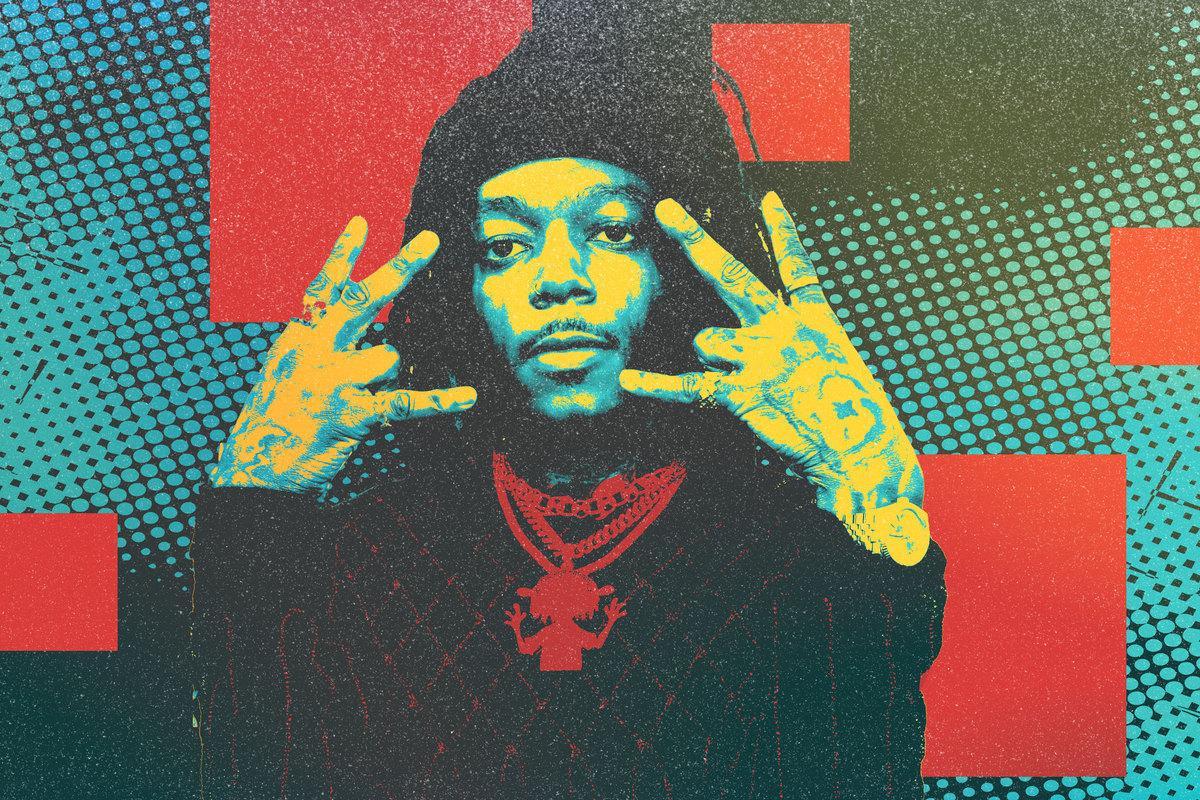
It’s March 2017, and the self-proclaimed East Atlanta playboy JID is sparking a blunt on top of his busted, white Pontiac G6. The beat-up whip can attribute most of its bumps and bruises to being pushed around Atlanta by JID during what can now be looked at as his rap origin story, when he received the boot from Hampton University (and its football team) in 2012. At the close of this mini-documentary, JID—then sporting short locs fenced in by a black bandanna—sits shotgun in the Pontiac with J. Cole in the driver’s seat vibing to the outro song “Lauder” off his debut album The Never Story.
That hooptie served as more than a visual flourish for JID—it gave him a jumping-off point as he chased his aspirations: “Pushing the same piece of shit until I get me a Bentley,” JID raps in the opening verse to “Lauder.” More than five years after JID signed with J. Cole’s Dreamville Records, “Lauder” reads like a mission statement. The Never Story just barely cracked the Billboard 200, but it definitely left a mark on critics and fans alike. The squeaky-voiced wordsmith’s frenetic flows and intricate rhyme schemes were a delivery system for his bag of dirty jokes, shades of soul, and endless poetic devices, becoming something out of a rap nerd’s wet dream. But the then-26-year-old found a way to avoid the tropes that typically lead to the best of the best rappers creating “scaring the hoes” music. Songs like “Never” showed he could get to rappity rapping over 808s, without killing the vibes by pressing the issue. The general consensus from this 12-track debut was that Dreamville’s latest draft pick had all the tools in his arsenal to be one of the most exciting rappers in the game for years to come. And the music then was only scratching the surface of who JID was as a human being, and who he could be as an artist with a bigger budget and platform.
Fast-forward five years, through a DJ Drama–assisted, well-received sophomore outing; through some show-stealing moments spread throughout projects with his Spillage Village crew and the greater Dreamville collective; through a broad list of ear-catching pop guest spots, rap sparring exercises, and a few loosies, and we arrive at The Never Story sequel, The Forever Story.
On The Forever Story, JID is like an athlete elevating his game to match the added pressure that comes with performing on a bigger stage. The production is grander. The guest list is loaded with legends and contemporary big fish. Yet still, what makes The Forever Story a rap album of the year contender is JID finding ways to add layers to his artistry while never sacrificing the rap mechanics that got him to the dance. He’s still a lyrical assassin, but his willingness to dive deeper into the ocean of vulnerability and sharpen his focus as a storyteller are some of the most clear signs of elevation between The Never Story and The Forever Story.
On “Crack Sandwich,” JID breathes life into a menacingly grim instrumental while jumping from early memories of fighting siblings and fixing sandwiches when he didn’t have McDonald’s money, to getting into full-blown street fights with his brothers and sisters by his side. The spliced in clips of JID’s family recounting these stories only enhance how vivid he makes these stories. The intentionality and focus in storytelling is something that was much less a priority on previous projects. On “Kody Blu 31,” it’s as if JID is performing open-heart surgery on himself, as the lyrics bleed out of him. He sings, “You know it rains for somethin’, you know the pain’s for somethin’ / I hope a change is comin’, just keep on swangin’ on,” as he attempts to console a friend grieving over the loss of her son over a tranquil, almost nautical Christo beat. And “Sistanem’’ reads like a last-ditch effort to maintain a bond with his sister as their relationship fractures while JID’s star rises.
While the vulnerability gives the album a better sense of wholeness, JID still might be at his best when letting his effortless flows take the wheel. Nowhere is that more apparent than on “Money,” where JID’s subjects zoom in and out of focus without warning: In the span of the second verse alone, JID goes from talking about his grind, to rapping about a blue-collar worker hoping a lottery ticket will put an end to his Walmart double shifts, to flipping the bird at rich, white N-word sayers Joe Rogan and Hulk Hogan, simply “because it flows.” All the while, he speeds up, then gently slows and stretches his cadences like an elastic band over the Rasputin’s Stash sample on Khrysis’s beat.
Maybe he’s just trying to appear humble, but if we take JID’s words at face value, he doesn’t sound as enamored with his own lyrical dexterity as most rap fans are. “I don’t even be thinking I’m a crazy lyricist, I just know how to say shit,” said JID during an interview with Hot 97 a few days ago. But when paired up with some of the greatest rappers in history, it becomes clear that JID is more than capable of holding his own. On “Just in Time,” the true master of “saying shit”—Lil Wayne—bends words to his will as he finds ways to excessively rhyme time with time, and line with line when barreling through the second half of his verse with a chaotic double-time flow. But just when it seems Wayne is done rapping and gives you half a second to collect your thoughts, JID grabs the flow like a baton and takes off running to the literal end of time, where he raps “What’s a modern rapper to a renaissance? / Nigga, I’ll be snappin’ till the end of time” as the beat dies under him and his voice fades into an echo.
With JID positioning himself as a standard-bearer for Southern lyricists, it shouldn’t be a shock that he wears his Wayne influence like a face tattoo. When firing on all cylinders, he sometimes sounds like a pitched-up version of the New Orleans rapper—considering his ability to dance through double entendres with electrifying cadences. But the influence of Yasiin Bey (née Mos Def) on JID is perhaps a little more surprising. However, JID doesn’t shy away from it: Lead single “Surround Sound” flips the same Aretha Franklin sample as “Ms. Fat Booty,” and Bey himself shows up for late-album highlight “Stars,” a song that almost mirrors the celestial sounds of Mos Def’s classic “Climb.” When it comes time for Bey’s closing verse, JID treats it like a monumental moment: the music stops, a digitized voice declares “And now, a word from our ancestors,” then a fresh beat drops—rolling out the red carpet for the Brooklyn legend to drop knowledge on.
The Wayne and Bey features lay JID’s reverence for rap history and tradition bare. But they also make it that much more exciting to project his future. With 2022 producing few transcendent albums from hip-hop heavyweights, The Forever Story is on the short list for the year’s best. But even in a stacked year, it’d hold its own: JID is a master of wordplay proving his pen game is just entering its prime, and Forever boasts the production and guest list to match. In the five years between Never and Forever, much like his locs, both JID’s fan base (which now sits at nearly 21 million monthly listeners on Spotify alone) and their expectations of him have grown significantly, and they’ll likely grow even more after this release. Gone are the days of surprise when it was shocking to hear JID go toe-to-toe with his label head J. Cole for the best verse on a song—now it’s become expected. No longer will that squeaky voice be confused with Kendrick or Anderson .Paak.
That old busted Pontiac he pushed around Atlanta is now nothing more than a dead relic used for album promotion. The ceiling has been raised, and visualizing the end of the road that JID now travels is even more exciting. Why can’t he go on a head-turning feature run that moves him into the genre’s A-list? Who’s to say other rap AOTY candidates aren’t on the horizon for the 31-year-old rapper with an album like this already under his belt? But with confirmation that DiCaprio 3 will be a Gangsta Grillz tape with DJ Drama, wherever the road takes him, it’s safe to say JID is ready to sit in the driver’s seat for the foreseeable future.

